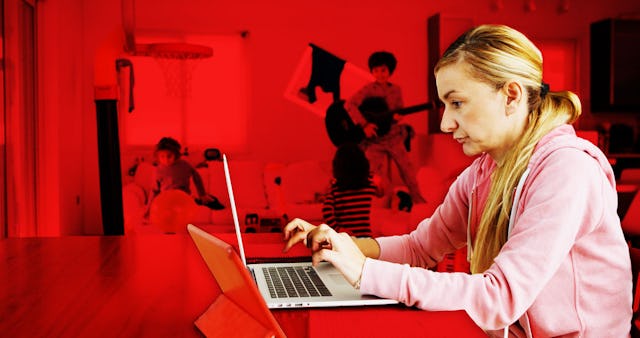Moms Are Being Hit Hard Again By This F*cking Pandemic

Late last week, my therapist asked me a pointed question. “How are you holding up in regards to the Delta variant?” she said. “Are you worried? Concerned?”
“Of course, I am,” I told her. I’m afraid, for myself and my children. Of shutdowns, lockdowns, and COVID-19. I am tired. Parenting during a pandemic is exhausting. And the lack of local oversight and mask mandates has been frustrating, at best. I just want to keep my family safe — alive and safe. But there was more to her question than that. I knew it. She knew it. And in the silence that followed, the truth came out.
“I love what I do,” I said. “I don’t want to lose my job.”
Of course, the relation between the two may not seem obvious, at least at first. After all, what does the Delta variant and COVID-19 have to do with my (non-Mommy) role? But millions of women are facing these types of fears and concerns (again) because as COVID numbers increase, daycares, schools, and camps are being shut-down — or closed — and when these closures occur, it is (usually) the woman who scrambles. She is the one who steps up, and takes time off. And some economists fear this will greatly affect our labor force. They warn that the United States may be on the verge of a massive second wave of women dropping out of the workforce.
“For the economy, overall, is this a big deal? Probably not. But is this a big deal for women? Yes it is. We risk more women being casualties of the great resignation,” Alicia Sasser Modestino, an economist and associate professor at Northeastern University, recently told The Washington Post.
Some argue that these fears are inflated, or over exaggerated. They say women are being dramatic, about their stressors and how COVID-19 is affecting their lives. But every house has a default parent — regardless of gender — and, historically speaking, the default parent is Mom. What’s more, facts are facts, and over the last 17 months, women have suffered. More than 13 million women stopped working at the beginning of the pandemic, The Washington Post reports, leading to the lowest levels of women in the labor force since the 1980s.
“Everyone is anxious about what is going to happen in the fall,” Misty Heggeness, a principal economist and senior adviser at the U.S. Census Bureau, told the Post, especially since women have not rebounded from the last wave. There are still about 1.5 million fewer working moms than pre-pandemic.
MoMo Productions/Getty
Fathers took a hit, too — with millions cutting their hours or taking time off — women, who typically (and unfairly) earn less than their male counterparts, have borne the brunt of this burden. They are the homeschoolers, caregivers, boo-boo menders, and keepers of all things in the house and home. What’s more, in addition to finances, researchers Alicia Sasser Modestino at Northeastern University and economist Laura Sherbin at consulting firm Seramount found two other factors determined whether or not women were (or are) able to keep their jobs: having flexibility in their schedule — and the ability to work from home — and having family nearby. Having a support system greatly increased the odds a woman would be able to keep her job.
That said, women are struggling on other fronts, too. A recent study out of the University of Chicago Medicine found U.S. women experienced an increased incidence of health-related problems due to COVID-19-related stressors, including “alarmingly high rates” of mental health problems, like depression and anxiety.
“Women are principally responsible for parenting, family caregiving and other essential work,” Marie Tobin, a professor of psychiatry at University of Chicago Medicine and co-author of the study, stated. “They are key to managing and recovering from this pandemic, and now are afflicted by very significant socioeconomic risk levels that appear to be drivers of anxiety, depression and traumatic stress. We should be especially concerned that socioeconomically vulnerable women are at high risk for developing pandemic-related psychiatric morbidity.” Or, in other words, we should be concerned about moms’ mental health.
That said, what comes next is unclear. Moms need help, that much is certain, but the amount of help we need varies, from person to person and situation to situation. What’s more, the support needs to come from various channels. Employers need to be more flexible. Variable hours and work from home options should be a given. Having a support system is key. Moms need time off. We need a physical and mental break, and men need to step up. Moms cannot be the only ones leaving the workforce or caring for the kids.
Will these changes happen quickly enough? Maybe, but probably not, thanks to the patriarchal norms that still frustratingly dominate in our society. Women have been in the workforce for decades and (for most) the coveted work/life balance still doesn’t exist.
But if women — and moms — are to survive this pandemic with their jobs and mental health intact, something needs to give.
This article was originally published on